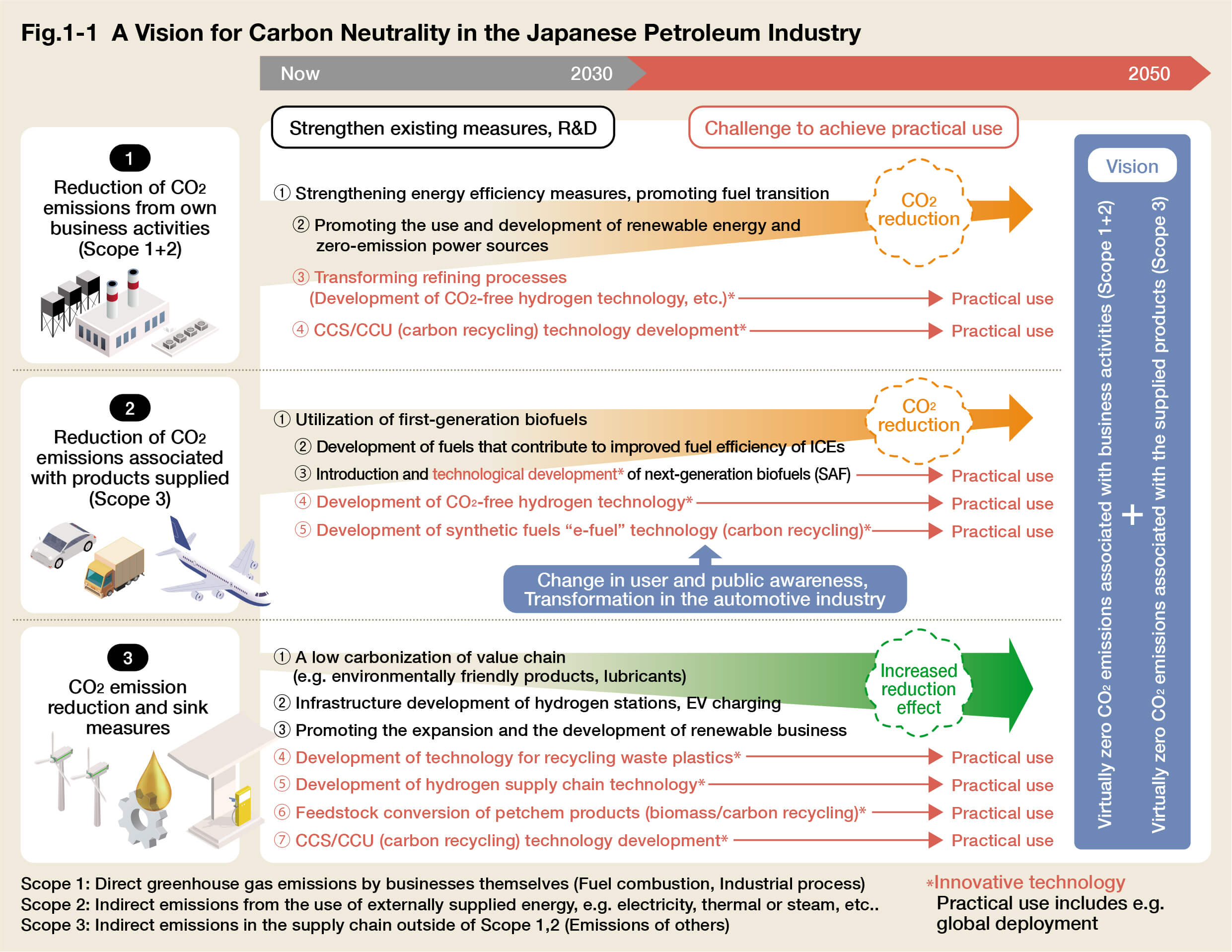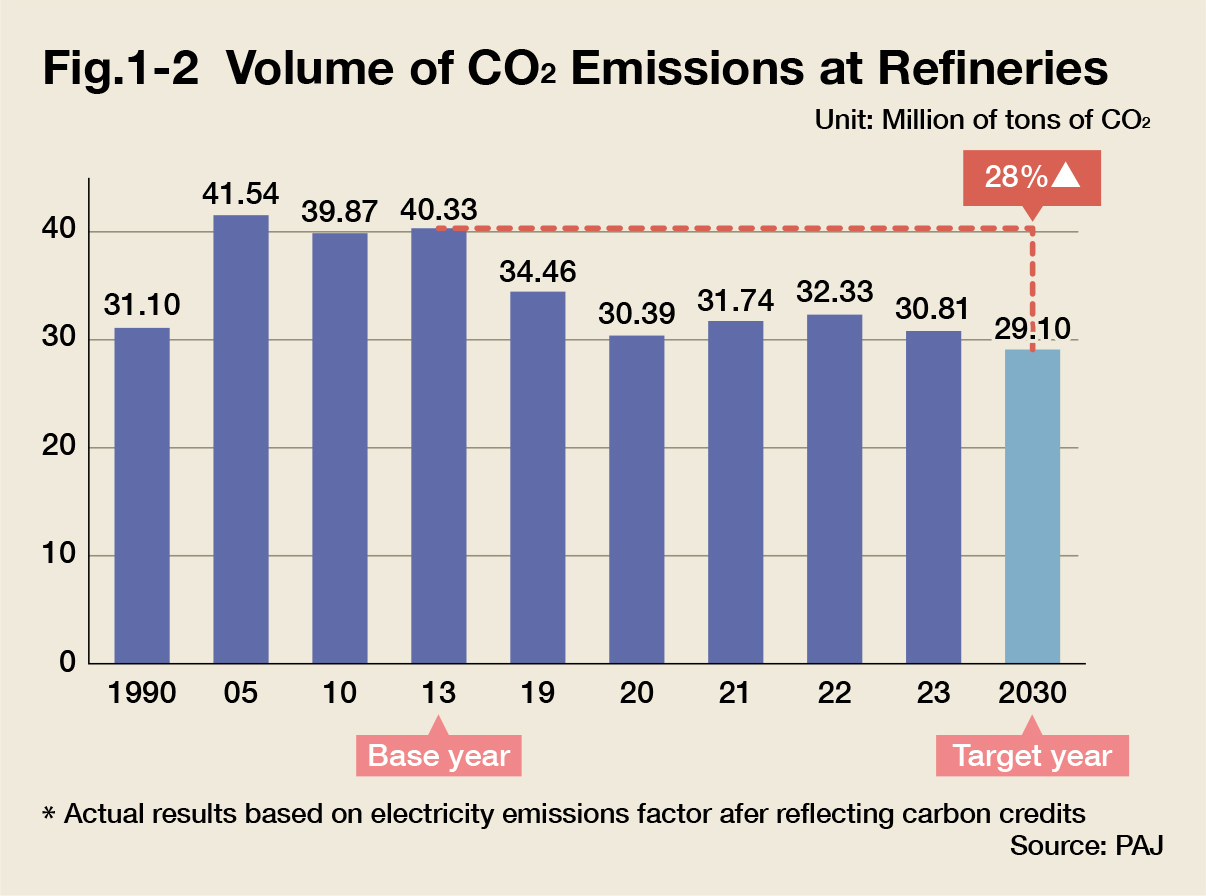The Petroleum Association of Japan announced its Vision toward Carbon Neutrality for the Oil Industry.
It shows that the oil industry will work to achieve carbon neutrality based on the following three pillars:
- (1) reduction of emissions associated with its business activities,
- (2) reduction of emissions associated with the products it supplies,
- (3) measures to reduce CO2 emissions and carbon sinks.
1.A vision for Carbon Neutrality in Japanese Petroleum Industry
In October 2020, the Japanese government declared that Japan would realize "Carbon Neutrality by 2050.” In response to this, the Petroleum Association of Japan (PAJ) renewed its “Long-term Low Carbon Vision for the Petroleum Industry” in 2019, and newly formulated the “Petroleum Industry’s Vision toward Carbon Neutrality.” Furthermore, the vision was revised in December 2022, based on the realization of innovative technology development, etc.
The biggest point of this vision was the aim of achieving virtually zero CO2 emissions (carbon neutrality) associated with business activities (in other words, Scope 1+2). In addition, the December 2022 revision included the additional challenge of achieving virtually zero CO2 emissions that are associated with the supplied products (Scope 3).
To achieve this, the petroleum industry as a whole will have to take on the challenge of not only strengthening existing measures, such as promoting energy conservation and the use and development of renewable energy, but also carrying out “innovative technology development” by 2030, such as the reform of the refining process through technological developments, including the use of CO2-free hydrogen, and the carbon recycle (CCS and CCU), and subsequently put them into societal implementation by 2050.
In addition, as measures for CO2 emission reduction and carbon sinks, the development of infrastructure, such as hydrogen fueling stations and EV charging stations, expansion of the renewable energy business, development of waste plastic recycling technology, and conversion of raw materials for petrochemical products to next-generation biomass, will contribute to the realization of carbon neutrality in society as a whole.
2.History of Initiatives of Global Warming Issues
The Petroleum Association of Japan (PAJ) formulated the “Petroleum Industry’s Voluntary Action Plan for Global Environmental Conservation” in 1997 and engaged in efforts to save energy at refineries until FY2012.
These efforts were followed in 2010 by the formulation of the “Petroleum Industry’s Action Plan for a Low Carbon Society,” announcing the goal to “achieve an energy saving volume of 530,000 kl of crude oil equivalents (volume from energy saving measures) at refineries by the end of FY2020 through energy saving measures from FY2010 onwards.” As a result of such efforts, an energy saving volume of 551,000 kl was reached in FY2016, realizing our goal.
With regard to initiatives for FY2020 and beyond, the “Petroleum Industry’s Action Plan for a Low Carbon Society – Phase II” was formulated in 2015, with “the achievement of energy saving of one million crude oil equivalents at refineries in FY2030 compared with FY2009 by means of energy saving initiatives enacted from FY2010 onward” being announced as a goal. In FY2021, an energy saving of 712,000 kl was reached.
In 2020, hearing that the Japanese government declared Japan would realize “Carbon Neutrality by 2050,” PAJ revised its “Action Plan for a Low Carbon Society” to the “Carbon Neutral Action by the Petroleum Industry” in 2021. Furthermore, in 2023, PAJ transitioned to total volume of CO2 emissions, in order for its numerical targets to conform with the national targets.
At present, the target is “to realize total volume of CO2 emissions of 29.10 million tons for 2030 (28% reduction compared with FY2013). Total volume of CO2 emissions in FY2023 was 30.81 million tons (a reduction of 23.6% compared with FY2013, with rate of progress towards goal of 84.7%).
3.Changes in GHG emissions
The quantity of greenhouse gas (GHG) emissions in Japan was approximately 1,135 million tons of CO2 (actual FY2022 figures of CO2 equivalent), with energy related CO2 accounting for over 90 percent of these CO2 emissions. Energy related CO2 emissions for FY2022 was 964 million tons, which was a decrease of 2.3% YOY, and a 22% decrease compared to the most recent peak in FY2013. While CO2 emissions increased temporarily due to the impact of nuclear power plants being shut down after the Great East Japan Earthquake, emissions have been on a downward trend thereafter as a result of the decrease in energy demand, spread of renewable energy, and low-carbon power generation from the restart of some nuclear power plants.
4.Heading towards 2050
The energy-related CO2 emissions of which around 1/3 was the result of the consumption of petroleum. Of the CO2 emissions from the consumption of petroleum, emissions from refineries (Scope 1) accounted for about 31 million tons, and the majority of the emissions came from petroleum consumed by the supplied petroleum products (Scope 3), so the reduction of these emissions is of great importance.
The petroleum industry intends to take on the challenge of reducing CO2 emissions associated with supplied petroleum products (Scope 3) to virtually zero through the development and commercialization of such innovative technologies as SAF, CO2-free hydrogen, ammonia, and synthetic fuel (e-fuel), as well as promoting the development of recyclable energies and other measures.
The challenge of reducing Scope 3 CO2 emissions to virtually zero is extremely ambitious and difficult to achieve.
Nevertheless, every oil company will contribute to the realization of carbon neutrality in society as a whole by making proactive efforts in the research, development, and societal implementation of carbon neutral technologies, as well as continue their activities for a stable supply of energy demanded by consumers.



